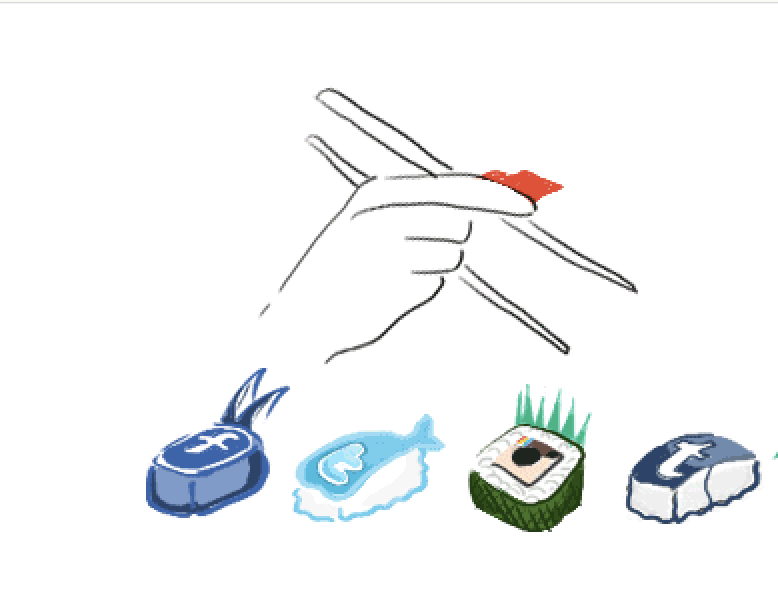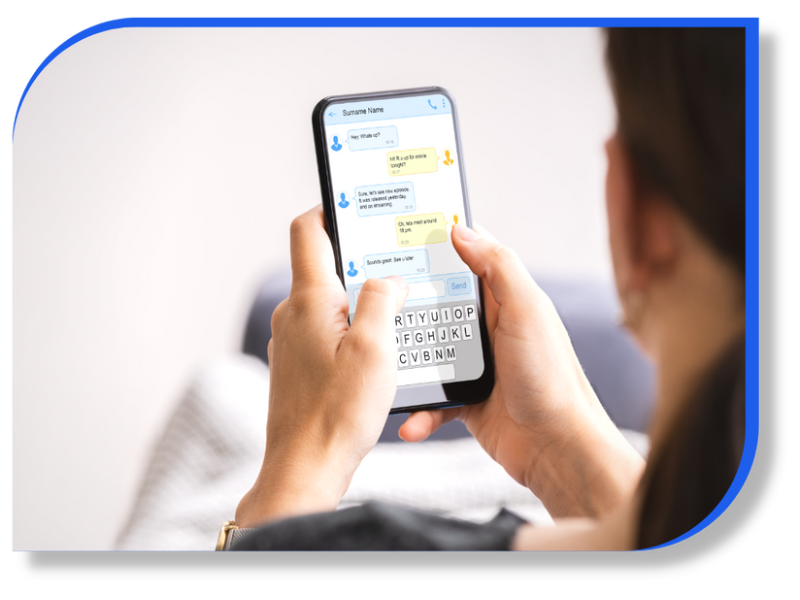Blog

5 Reasons Why Your Business Can't Afford to Ignore Omnichannel Software Anymore
As a business owner, I understand the importance of staying ahead of the curve.
In today's fast-paced world, it's crucial to keep up with the latest trends and technologies to remain competitive. One such trend that has taken the business world by storm is omnichannel software. If you're not familiar with this term, don't worry - I'll explain everything in detail. In this article, I'll share five reasons why your business can't afford to ignore omnichannel software anymore..

8 Secrets of Email Marketing
As someone who has been in the email marketing industry for years, I have learned a lot about what works and what doesn't. In this article, I'm going to share with you eight secrets that will help you take your email marketing campaigns to the next level.Learn More
Complete 90-Day Content Marketing Guide
This Complete 90-Day Content Marketing Guide will help you connect with your customers and turn your shoppers from prospective buyers into high-paying customers faster than ever before. By creating an effective content marketing plan you will generate more warm inbound leads as customers will self-identify then you will qualify them, and empower them to buy without discounting your services and products.


10 Smart Ways to Use SMS Marketing to Engage Your Customers!
As a business owner, I know how important it is to keep my customers engaged.
In today's world, where everyone is constantly on their phones, SMS marketing has become an essential tool for businesses to reach out to their customers and keep them engaged. Learn More
Major Playbook to Email Marketing
The Major Playbook to Email Marketing will help you connect with your customers and turn your shoppers from prospective buyers into high-paying customers faster than ever before. By creating an effective email marketing plan, you will generate more warm inbound leads as customers will self-identify, qualify them, and empower them to buy without discounting your services and products.


5 Little-Known Hacks for Cold Emailing Success
As someone who has sent countless cold emails over the years, I know firsthand how frustrating it can be to send out dozens of messages and receive little to no response.
However, through trial and error, I have discovered several hacks that have significantly increased my success rate when it comes to cold emailing.
In this article, I will share with you five little-known hacks for cold emailing success. Learn More
Major Blueprint On Adopting a CXM
This Blueprint On Adopting a CXM will help you turn your shoppers from prospective buyers into high-paying customers faster than ever before by creating efficiency in your sales process by quickly identifying their particular needs, qualifying them, and empowering them to buy without discounting your services, and products. This Blueprint On Adopting a CXM will help you turn your shoppers from prospective buyers into high-paying customers faster than ever before by creating efficiency in your sales process by quickly identifying their particular needs, qualifying them, and empowering them to buy without discounting your services and products.

Latest Blog Posts

Mastering the Art of Cold Calling: A Comprehensive Guide
Cold calling has earned itself quite a reputation in the sales world. For many sales reps, it's a necessary evil — a tricky, challenging process that requires a blend of persistence, patience, and skill. But when done right, it can be an effective tool for generating leads and increasing sales. In this comprehensive guide, we will explore what cold calling is, why it's still relevant, and provide eight insightful tips to make your cold calling efforts more successful.
Defining Cold Calling
Cold calling is a sales tactic where sales reps initiate contact with potential customers or prospects who haven't expressed any interest in the offered products or services. This outreach method is typically carried out over the phone, though it can also be done in person or via other communication channels.
Despite its simplicity, cold calling is a formidable challenge. Convincing someone you've just called out of the blue about your services can be tough, and doing it consistently is even harder. But with the right approach, cold calling can be turned into an effective lead generation and sales tool.
Understanding Cold Calling's Success Rate
While cold calling can be a daunting task, it has been proven to be effective. According to a study by RAIN Group, 82% of decision-makers accept meetings with sales professionals who proactively reach out. Top-performing sales pros are even able to book 52 meetings for every 100 contacts.
Another research by Sales Insight Lab revealed that 41.2% of sales reps believe the phone is the most effective sales tool at their disposal. Clearly, the art of cold calling is far from dead.
The Psychology Behind Cold Calling
To truly excel at cold calling, one must understand its psychological aspects. Two common barriers to cold calling success are the fear of rejection and the fear of the unknown. Top-performing sales professionals understand that rejection is an integral part of the sales process. They see rejection not as a setback but as an opportunity to improve and stand out.
On the other hand, prospects may be hesitant due to their fear of the unknown. It's crucial for sales reps to alleviate this fear by providing valuable information about their product or service and demonstrating how it can solve the prospect's problem.
Embracing Rejection in Cold Calling
One of the keys to successful cold calling is learning to accept and deal with rejection. No one closes 100% of their prospects, and rejection is a necessary part of any sales activity. Here are a few strategies to help you handle rejection:
Be persistent: If your calls are going to voicemail, don't give up. Reach out repeatedly until you make contact.
Practice handling objections: Use practice calls to improve your response to sales objections. Keep the conversation flowing and strive to turn a "no" into a "yes".
Use rejection as motivation: Don't let rejections bring you down. Instead, use them as motivation to keep making calls. Remember, cold calling is a numbers game.
Setting Your Sights on Immediate Learning, Not Immediate Sales
Cold calling is a skill that can't be mastered overnight. Instead of focusing on immediate sales, aim to learn something from every conversation with a prospect. This learning-centric approach will help you improve over time and become a better cold caller.
The Importance of Research in Cold Calling
One of the most crucial cold calling tips is to do your homework before picking up the phone. Researching your prospect will provide you with valuable insights that can guide your conversation and help you tailor your pitch to their specific needs and problems.
Your research should cover various aspects such as the prospect's industry, their company's mission, leadership, and any specific pain points or challenges they might be facing. The more you know about your prospect, the more personalized and effective your cold call will be.
Crafting an Effective Cold Call Script
Having a cold call script is invaluable, especially for beginners. A well-crafted script serves as a roadmap, guiding the conversation and ensuring that you cover all the essential points. However, while a script can provide a solid foundation, it's crucial not to recite it word for word. Allow room for spontaneity and natural conversation flow to keep the call engaging and authentic.
Knowing When to Make the Cold Call
Timing can significantly impact the success of your cold call. Research shows that the best time to make a cold call is between 4:00 PM and 5:00 PM local time, with Wednesday and Thursday being the most effective days of the week. Plan your calls accordingly to increase your chances of connecting with prospects.
Starting the Cold Call with a Proactive Opener
A proactive opener can set a positive tone for the cold call. Instead of beating around the bush, get straight to the point and state the reason for your call. This approach shows your prospect that you value their time and have a clear purpose for the call.
Focusing on Selling Over Discovery During the Cold Call
While discovery is an important part of the sales process, it should not be the focus of your initial cold call. Instead, prioritize selling your product or service. Use the call to educate your prospect about your offering and get them interested enough to move to the next step in the sales process.
Conclusion
Cold calling can be a powerful tool in a sales rep's arsenal when done right. By understanding the psychology behind cold calling, embracing rejection, conducting thorough research, crafting an effective script, and using strategic timing, you can increase your success rate and boost your sales. Remember, cold calling is a skill that can be honed over time. With patience, persistence, and the right strategies, you can master the art of cold calling.

Mastering the Art of Cold Calling: A Comprehensive Guide
Cold calling has earned itself quite a reputation in the sales world. For many sales reps, it's a necessary evil — a tricky, challenging process that requires a blend of persistence, patience, and skill. But when done right, it can be an effective tool for generating leads and increasing sales. In this comprehensive guide, we will explore what cold calling is, why it's still relevant, and provide eight insightful tips to make your cold calling efforts more successful.
Defining Cold Calling
Cold calling is a sales tactic where sales reps initiate contact with potential customers or prospects who haven't expressed any interest in the offered products or services. This outreach method is typically carried out over the phone, though it can also be done in person or via other communication channels.
Despite its simplicity, cold calling is a formidable challenge. Convincing someone you've just called out of the blue about your services can be tough, and doing it consistently is even harder. But with the right approach, cold calling can be turned into an effective lead generation and sales tool.
Understanding Cold Calling's Success Rate
While cold calling can be a daunting task, it has been proven to be effective. According to a study by RAIN Group, 82% of decision-makers accept meetings with sales professionals who proactively reach out. Top-performing sales pros are even able to book 52 meetings for every 100 contacts.
Another research by Sales Insight Lab revealed that 41.2% of sales reps believe the phone is the most effective sales tool at their disposal. Clearly, the art of cold calling is far from dead.
The Psychology Behind Cold Calling
To truly excel at cold calling, one must understand its psychological aspects. Two common barriers to cold calling success are the fear of rejection and the fear of the unknown. Top-performing sales professionals understand that rejection is an integral part of the sales process. They see rejection not as a setback but as an opportunity to improve and stand out.
On the other hand, prospects may be hesitant due to their fear of the unknown. It's crucial for sales reps to alleviate this fear by providing valuable information about their product or service and demonstrating how it can solve the prospect's problem.
Embracing Rejection in Cold Calling
One of the keys to successful cold calling is learning to accept and deal with rejection. No one closes 100% of their prospects, and rejection is a necessary part of any sales activity. Here are a few strategies to help you handle rejection:
Be persistent: If your calls are going to voicemail, don't give up. Reach out repeatedly until you make contact.
Practice handling objections: Use practice calls to improve your response to sales objections. Keep the conversation flowing and strive to turn a "no" into a "yes".
Use rejection as motivation: Don't let rejections bring you down. Instead, use them as motivation to keep making calls. Remember, cold calling is a numbers game.
Setting Your Sights on Immediate Learning, Not Immediate Sales
Cold calling is a skill that can't be mastered overnight. Instead of focusing on immediate sales, aim to learn something from every conversation with a prospect. This learning-centric approach will help you improve over time and become a better cold caller.
The Importance of Research in Cold Calling
One of the most crucial cold calling tips is to do your homework before picking up the phone. Researching your prospect will provide you with valuable insights that can guide your conversation and help you tailor your pitch to their specific needs and problems.
Your research should cover various aspects such as the prospect's industry, their company's mission, leadership, and any specific pain points or challenges they might be facing. The more you know about your prospect, the more personalized and effective your cold call will be.
Crafting an Effective Cold Call Script
Having a cold call script is invaluable, especially for beginners. A well-crafted script serves as a roadmap, guiding the conversation and ensuring that you cover all the essential points. However, while a script can provide a solid foundation, it's crucial not to recite it word for word. Allow room for spontaneity and natural conversation flow to keep the call engaging and authentic.
Knowing When to Make the Cold Call
Timing can significantly impact the success of your cold call. Research shows that the best time to make a cold call is between 4:00 PM and 5:00 PM local time, with Wednesday and Thursday being the most effective days of the week. Plan your calls accordingly to increase your chances of connecting with prospects.
Starting the Cold Call with a Proactive Opener
A proactive opener can set a positive tone for the cold call. Instead of beating around the bush, get straight to the point and state the reason for your call. This approach shows your prospect that you value their time and have a clear purpose for the call.
Focusing on Selling Over Discovery During the Cold Call
While discovery is an important part of the sales process, it should not be the focus of your initial cold call. Instead, prioritize selling your product or service. Use the call to educate your prospect about your offering and get them interested enough to move to the next step in the sales process.
Conclusion
Cold calling can be a powerful tool in a sales rep's arsenal when done right. By understanding the psychology behind cold calling, embracing rejection, conducting thorough research, crafting an effective script, and using strategic timing, you can increase your success rate and boost your sales. Remember, cold calling is a skill that can be honed over time. With patience, persistence, and the right strategies, you can master the art of cold calling.

Major Playbook to SMS Marketing
This Major Playbook to SMS Marketing will help you turn your shoppers from prospective buyers into high-paying customers faster than ever before by creating efficiency in your sales process by quickly identifying their particular needs, qualifying them, and empowering them to buy without discounting your services and products.


